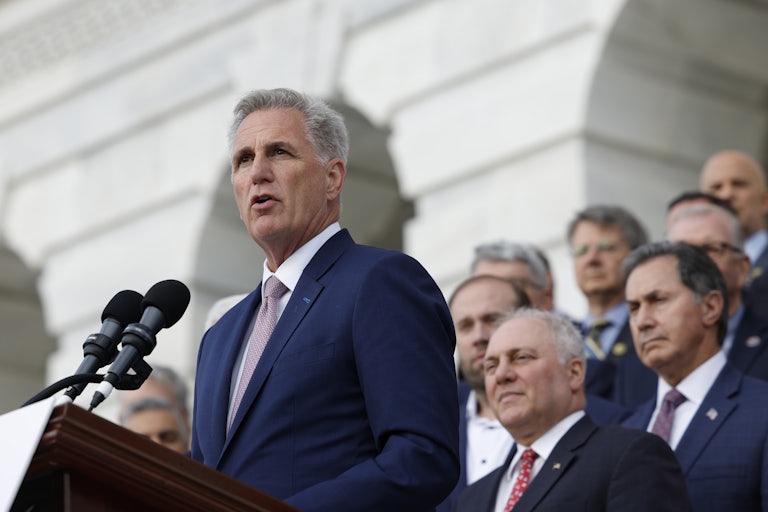Kevin McCarthy Begs Republicans to Back His Unfinished Debt Ceiling Plan
This isn’t the first time McCarthy has had to ask his party to please just get behind him.

Kevin McCarthy’s debt ceiling bill goes up for a vote next week—despite being so unpopular in his own party that he is reportedly begging people to back it.
The House speaker unveiled a plan Monday to raise the debt ceiling into next year, so that the United States won’t default on its debt. Democrats and Republicans are locked in a protracted battle over the debt limit, and the GOP had previously indicated they were willing to hold the debt ceiling hostage in order to reduce government spending.
McCarthy offered few specifics about his plan, which has turned many of his fellow House Republicans off. Although House Rules Chairman Tom Cole told CNN Tuesday the debt limit bill will go up for a vote next week, McCarthy reportedly begged his colleagues to back the measure in a closed-door meeting earlier in the day.
McCarthy told Republicans that his deal isn’t about getting everything they want but about getting President Joe Biden back into negotiations, according to CNN. But many Republicans are unsure about the bill, particularly members of the House Freedom Caucus.
The far-right wing of the House Republicans was primarily responsible for forcing all of us to sit through seemingly endless rounds of votes for House speaker in January. Scott Perry, who chairs the caucus, said McCarthy’s debt proposal was too vague. “I don’t know what’s in the package completely—that’s the issue,” he told reporters.*
Anna Paulina Luna said the proposed budget cuts “should go further,” while Andy Biggs—who ran against McCarthy for speaker—said the proposal was a “long ways away” from what he would support.
“I’m not at the table,” Biggs said.
Other, more moderate Republicans also think the debt limit bill needs work. Nancy Mace said that holding the vote next week is “probably not” enough time to convince her to support the measure. Marc Molinaro said the GOP is “making progress, but we’re still taking a look at it.”
McCarthy promised not to touch Medicare or Social Security when cutting federal spending, a particular sticking point in the budget debate. Republicans have generally tried to end the entitlement programs since they began nearly a century ago, despite the idea being wildly unpopular. Slashing Social Security and Medicaid have repeatedly been suggested during recent debt ceiling debates.
Republican Matt Gaetz has proposed a plan for Medicaid work requirements, while Dusty Johnson proposed a separate plan for food stamp work requirements. It’s unclear which, if either, plan will make it into the bill. While work requirements would definitely reduce Medicaid costs, they would do so by denying health care to countless people.
McCarthy holds a razor-thin majority in the House, and he needs 218 votes to get his bill passed. It’s unclear if he can rally all the support he needs to push the measure through. Democrats are refusing to compromise on the debt ceiling, and if the battle goes on much longer, the United States could be in serious trouble.
The government already hit the debt ceiling in January, and Treasury Secretary Janet Yellen has previously warned the U.S. could default on its debt by the summer if the cap isn’t raised. “It’s simply a recipe for economic and financial catastrophe to think we can pay some of our bills and not all of them,” Yellen told the Senate Finance Committee in mid-March.
* This piece originally misstated the leader of the Freedom Caucus.








